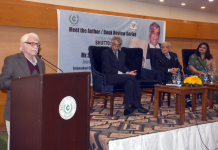Sources indicate that counterterrorism will be a top priority in the Kabul talks. Pakistan has repeatedly raised concerns over the presence of Tehreek-e-Taliban Pakistan (TTP) sanctuaries inside Afghanistan, which Islamabad says are being used to launch cross-border attacks
Ansar M Bhatti
ISLAMABAD: The foreign ministers of Pakistan, Afghanistan, and China are scheduled to convene in Kabul on August 20 for high-level trilateral talks aimed at strengthening regional cooperation, sources confirmed on Thursday.
The meeting will bring together Chinese Foreign Minister Wang Yi, Pakistan’s Deputy Prime Minister and Foreign Minister Ishaq Dar, and Afghanistan’s Acting Foreign Minister Amir Khan Muttaqi. According to diplomatic sources, the primary focus will be on enhancing counterterrorism collaboration, expanding the scope of the China-Pakistan Economic Corridor (CPEC) into Afghanistan, and discussing broader regional stability initiatives.
This will be the first formal trilateral meeting between the three countries since the Taliban returned to power in Afghanistan in August 2021. While Pakistan and China have maintained working relationships with the interim Afghan government, international recognition remains withheld, largely due to concerns over human rights, counterterrorism commitments, and inclusive governance.
The proposed expansion of CPEC — a multi-billion-dollar flagship project under China’s Belt and Road Initiative — to Afghanistan has been under discussion for several years. Islamabad and Beijing believe Afghanistan’s integration into regional connectivity projects could provide much-needed economic opportunities and stability, while Kabul sees it as a way to break its economic isolation.
Sources indicate that counterterrorism will be a top priority in the Kabul talks. Pakistan has repeatedly raised concerns over the presence of Tehreek-e-Taliban Pakistan (TTP) sanctuaries inside Afghanistan, which Islamabad says are being used to launch cross-border attacks. China, too, is worried about extremist networks in the region, particularly groups that threaten its western Xinjiang region, such as the East Turkestan Islamic Movement (ETIM).
The trilateral format is expected to explore practical mechanisms for intelligence sharing, border management, and coordinated operations to curb militant activity.
Earlier this month, Acting Foreign Minister Amir Khan Muttaqi was due to visit Islamabad on August 5 for bilateral talks with Ishaq Dar. However, the visit was abruptly called off, with both sides citing “technical reasons.” It later emerged that the UN Security Council did not grant an exemption for Muttaqi to travel, as he remains on the UN sanctions list of Taliban officials.
This time, the meeting in Kabul circumvents that restriction, as foreign diplomats are free to travel to Afghanistan to meet sanctioned individuals.
Following the Kabul meeting, Chinese Foreign Minister Wang Yi is expected to travel to Islamabad on August 21. His visit will likely focus on follow-up discussions regarding CPEC, bilateral trade, and regional security, as well as Pakistan’s growing economic challenges.
The trilateral initiative comes at a time when the region is facing heightened security threats, slow economic recovery, and shifting geopolitical dynamics. Both Pakistan and China have vested interests in preventing Afghanistan from becoming a breeding ground for terrorism and instability. The success of the upcoming talks could pave the way for deeper cooperation, though much will depend on Kabul’s willingness to address the concerns of its neighbors and the international community.

















